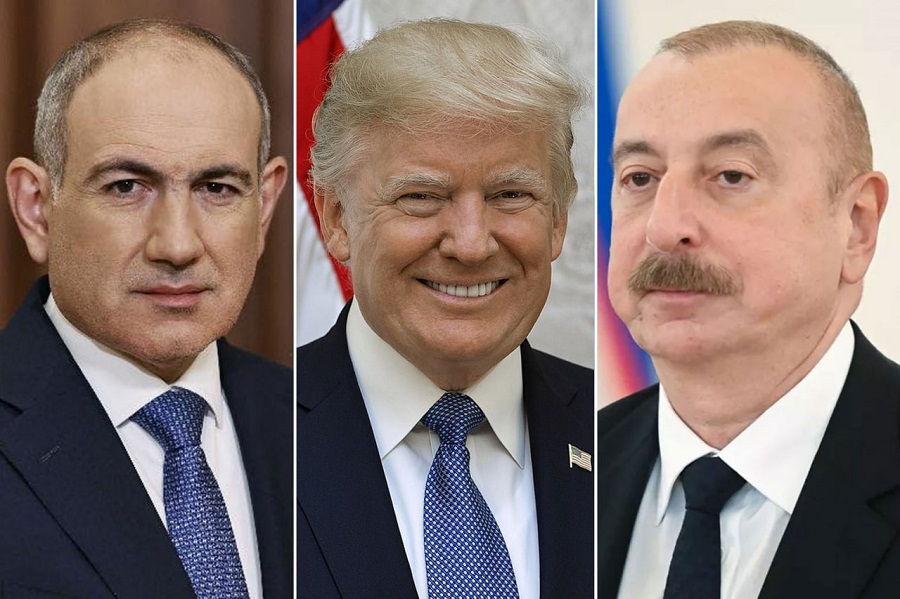The American Conservative. For the U.S., there are few concrete benefits and many risks attending the Armenia–Azerbaijan deal.
Before applauding President Donald Trump’s meeting with Armenian and Azerbaijani leaders in Washington on August 8, one should ask: Why is America involved at all in a centuries-old conflict 6,000 miles away in a place that offers the U.S. little strategic value? The White House meeting was heralded as a historic breakthrough, but the resulting ”Joint Declaration” achieves little beyond creating new potential headaches for American foreign policy.
The declaration’s seven points contain only four substantive provisions, none of which meaningfully advance peace.
First, the peace agreement between Armenia and Azerbaijan was merely initialed by foreign ministers, not signed by Armenia’s Prime Minister Nikol Pashinyan and Azerbaijan’s President Ilham Aliyev. Historically, many documents failed at this stage, never getting signed. The deferral allows both sides—and Trump—to claim progress while avoiding actual commitments.
Read also
Azerbaijan’s demand that Armenia remove references to Nagorno-Karabakh (a disputed territory over which both sides fought two bloody wars, in the early 1990s and 2020s) from its constitution—seen by Yerevan as a sovereignty violation—was conspicuously omitted from the declaration. Yet Baku has not dropped the issue. Amending Armenia’s constitution would require a referendum, which Pashinyan’s increasingly authoritarian government would struggle to pass amid widespread opposition to what many Armenians view as a humiliating surrender.
Further, border issues are ignored. The declaration vaguely affirms “territorial integrity,” but does not address Azerbaijan’s occupation of at least 83 square miles of Armenian territory. Without a withdrawal commitment, this is less a peace deal than a ratification of conquest.
The sides asked to dissolve the Organization for Security and Cooperation in Europe (OSCE) Minsk Group, tasked since 1992 with resolving the conflict between Armenia and Azerbaijan. That was the lowest-hanging fruit; the group, co-chaired by the U.S., France, and Russia, has been defunct for years. Its formal dissolution requires a vote at the OSCE ministerial in December, making this provision largely symbolic.
The most controversial element is the rebranded ”Trump Route for Peace and Prosperity” (TRIPP)—a vague U.S.-backed infrastructure project that effectively grants Azerbaijan its long-sought land access through Armenia to the exclave of Nakhchivan and Turkey, better known as the “Zangezur corridor.”
While the declaration avoids the term “corridor,” it explicitly guarantees Azerbaijan “unimpeded” transit rights—Aliyev’s key demand—while Armenian reciprocal rights are left only vaguely defined. TRIPP is pitched as a transformative economic lifeline, but its details are conspicuously absent. If it is meant to serve as part of an EU-backed ”Middle Corridor” for Eurasian trade, bypassing Russia and Iran, why should America get involved? Europe has far greater stakes in Eurasian trade and should bear the costs.
Worse, even though the TRIPP is supposed to be run by a private consortium and operate under Armenian law, it may be only a matter of time before potential U.S. security guarantees for the route are put on the agenda—a disastrous idea. Stationing American troops along the Araxes River, directly on Iran’s border, would needlessly provoke Tehran for no strategic gain. Iran’s Supreme Leader’s adviser Ali Akbar Velayati has already warned against any U.S. military presence, and, while his threats may be bluster, why test them?
Beyond the declaration, two additional issues should alarm advocates of restraint in U.S. foreign policy.
First is the suspension of Section 907 of the 1992 Freedom Support Act adopted by the U.S. Congress. This law restricts U.S. military aid to Azerbaijan but has been routinely waived by U.S. presidents since 2002, starting with George W.Bush under the pretext of counterterrorism cooperation. As a result, from 2002 to 2020, the Departments of State and Defense (DOD) reported providing about $164 million for security assistance to Azerbaijan.
After Azerbaijan’s 2023 ethnic cleansing of Nagorno-Karabakh—which forcibly expelled 100,000 Armenians—the Biden administration, to its credit, suspended the waiver. The current Secretary of State Marco Rubio pushed back in the Senate for even more—to repeal the waiver provision from the legislation altogether through the Armenian Protection Act. Now, the U.S. is considering reinstating it, effectively rewarding Baku’s policies. Azerbaijan is already a close partner of Israel and Turkey; it does not need American arms. If anything, Congress should repeal the waiver authority altogether.
Eldar Mamedov






















































